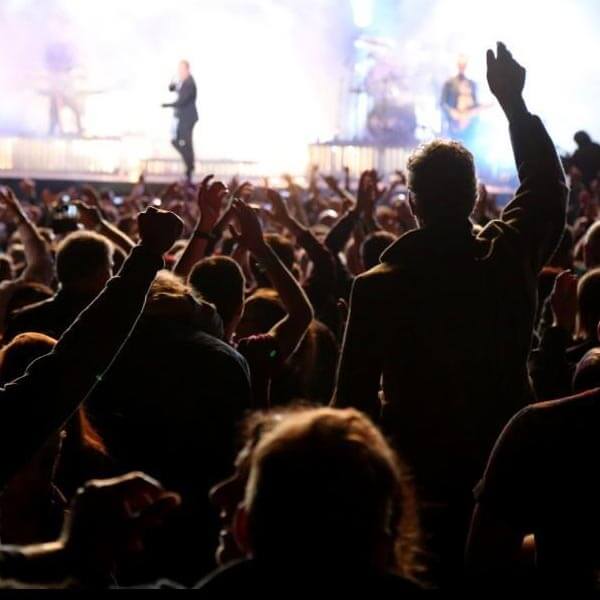
Massive Attack: 25 Years of Blue Lines
25 years on from the release of their seminal debut, Jimmy Coultas draws parallels with Massive Attack and the grime movement to attest why this album remains a defining masterpiece.
Jimmy Coultas
Last updated: 24th May 2016
Image: Massive Attack
UK hip hop is in fine fettle in 2016. The mainstream revitalisation of grime, over a decade on from Dizzee Rascal ensnaring the Mercury Music prize, has seen the sounds' success put Big Narstie on Channel 4 news, Skepta get eight figure YouTube hits for a video that cost £80 and Kano drop a brilliantly received album earlier this year (read our Made in the Manor review). The journey to where we are now owes plenty to a litany of trailblazers, each paving the way in differing directions.
There's the vaunted golden age of late eighties UK hip hop in Hijack and London Posse, and the second wavers that followed a decade later, Taskforce and Roots Manuva among them. Then the garage culture of MJ Cole and DJ Zinc, and the every man brilliance of The Streets. Stormzy's down to earth swagger owes equal parts to Manuva's breakneck speed downing of ten pints of bitter and Mike Skinner's chattering about life's idiosyncrasies as it does Skibadee holding court in Bagleys in the late nineties.
Another group that may not offer the same obvious musical lineage but undoubtedly proved British hip hop could cut it, paving the way for most of the above and many more since, is Massive Attack. Their debut Blue Lines turns 25 today (stream above on Spotify), and all those years later remains an infectiously wistful mixture of bluesy samples, soulful vocals and hushed raps.
The stylistic similarities between it and grime aren't immediately clear - the rapid fire aggression of the former almost a world away from the smoked out dubby lonerism of the latter - but they both came from similar places. Wiley et al thrust their genre forward through inner city raves and pirate radio, Massive Attack also powered by the constraints of urban living and their own unique soundsystem community.
Bristol's multi-cultural heritage gave rise to a curious melting pot in the eighties, pioneered by the DJ collective The Wild Bunch. They utilised dub and reggae as the backbone for a litany of sounds which also raided ambient electronic and punk, crafting soundscapes that were laid back, experimental and more wide ranging than anything else at the time.
Massive Attack were members, whilst Neneh Cherry was loosely affiliated (she name-checked them in her breakout hit 'Buffalo Stance') and it also counted producer Nellee Hooper among its ranks, who worked on both Blue Lines and Soul II Soul's breakout LP Club Classics Vol 1. The clique's aural footprint is redolent throughout the release.
Consisting of 3D, Daddy G and Mushroom, Massive Attack were joined by singer Shara Nelson and reggae veteran Horace Andy. Elsewhere on/off member Tricky also came up with the goods on his three appearances and Tony Bryan added a honey drenched tint to a cover of William DeVaughan's 'Be Thankful for what you got'. They coalesced to create a record which was deliriously downbeat both in tempo and subject matter.
What's striking about Blue Lines, as well as it's diverse aural textures, was the darkness. As easy as it is to dig into - it's nine tracks perfect to kick back to in the summer - there's paranoia at every turn and a sinister tint to it's beauty; not least the tragic tale of unrequited love that powers it's most famous hit 'Unfinished Sympathy' (below).
Find Massive Attack tickets.
Take opener 'Safe from Harm' - Nelson threateningly imparts "but if you hurt what's mine, I'll sure as hell retaliate". 3D is shifty on the same track, "I was lookin' back to see if you were lookin' back at me, To see me lookin' back at you", arguing all isn't well in the MA camp. It's a theme taken up by Tricky on 'Daydreaming' where he laments "trouble and strife ain't no sunshine in my life", badding to the foreboding.
Nelson's sense of loss also crops up on again 'Lately', where everyone else's love makes her realise "there's only me". Uneasy stuff, but this frequent heartache sounds sublime with the exquisite aural backdrop that underpins it. 'Lately' benefits from sampling Lowrell's killer seventies soul staple 'Mellow Mellow', 'Daydreaming' equally indebted to the beguiling 'Mambo' from Wally Badarou. There literally isn't a wrong turn at any juncture.
From this LP spawned the term trip-hop (a genre definition much maligned by the group themselves), with a further obvious musical influence on the likes of Radiohead, Burial and The XX. It gave further credence to an idea you could be scared, angry and depressed and turn this into hauntingly beautiful music, capturing that emotional fragility perfectly.
But it also proved sticking to your nationalistic personality and traits was the way forward. Perhaps a more obvious modern heir to that sound would be the musings of Loyle Carner, but every UK emcee bringing the real owes a debt of gratitude to these Bristollian introverts. A quarter of a century later Blue Lines remains the definitive British hip hop LP.
Massive Attack headline British Summer Time 2016 Friday July 1st at Hyde Park.
Like this? Try Massive Attack at Manchester Apollo review.
Read more news























